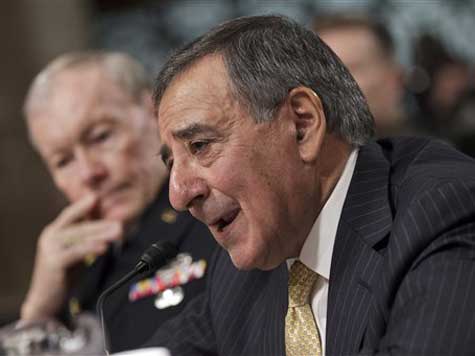WASHINGTON (AP) – Defense Secretary Leon Panetta and the nation’s top military leader on Tuesday defended the Pentagon’s slimmed-down, $614 billion budget, telling lawmakers it’s time to show Congress is serious about reducing the deficit.
Testifying before the Senate Armed Services Committee, Panetta warned lawmakers that budget cuts will hit all 50 states, but he says the reductions have been carefully planned and there is little room for changes.
Army Gen. Martin Dempsey, the chairman of the Joint Chiefs of Staff, said the budget tradeoffs were tough and complex, but they will produce the savings mandated by the $487 billion in reductions over a decade the President Barack Obama and congressional Republicans agreed to last summer.
“They will not lead to a military in decline,” Dempsey said. “Rather, this budget will maintain our military’s decisive edge and help sustain America’s global leadership.”
The testimony immediately met resistance from members of the committee. Sen. Carl Levin, D-Mich., the panel’s chairman, insisted that the military look to closing bases in Europe and overseas before targeting installations in the United States. Sen. John McCain of Arizona, the committee’s top Republican and Obama’s presidential foe in 2008, expressed reservations with the budget and complained that it “continues the administration’s habit of putting short-term political considerations over our long-term national security interests.”
The proposed defense budget for the year beginning Oct. 1 includes $525.4 billion in base spending and another $88.5 billion for the wars in Afghanistan and Iraq. The total is nearly $32 billion less than this year’s budget.
“It was this Congress that mandated, on a bipartisan basis, that we reduce the defense budget, and we need your partnership to do this in a manner that preserves the strongest military in the world,” Panetta said. “This will be a test of whether reducing the deficit is about talk or action.”
Defense officials have laid out plans to find about $260 billion in savings over the next five years, including moves to slash the size of the Army and Marine Corps, cut back on shipbuilding, and delay the purchase of some fighter jets and other weapons systems.
The plan also slashes war spending. Money for Iraq and Afghanistan will drop from $115 billion this year to $88.5 billion, with less than $3 billion spent for security in Iraq. It also cuts in half the amount spent on training and equipping Afghanistan’s security forces–a key element to the U.S. effort to gradually withdraw forces and transfer security responsibility to the Afghans.
While military personnel still would get a 1.7 percent pay raise, retirees would get hit with a series of increases in health care fees, co-pays and deductibles. The impact would be greater on those who are under 65 and are likely to have another job, as well as on those who make more money.
Senators on Monday also complained that President Barack Obama and his defense team have made no plans to deal with an additional $492 billion in across-the-board military cuts that will occur in January 2013 if Congress doesn’t act to avoid them.
Panetta said that since it is now apparent what the current cuts will do, he hopes that Congress will be persuaded to avoid the additional 2013 reductions.
Dempsey said that even though there are fewer than 90,000 troops deployed in combat, compared with more than 200,000 just two years ago, the military must spend money to reset and restore itself. War-torn equipment must be replaced, weapons need to be modernized and troops need to be retrained, he said.
“We will have to do all of this in the context of a security environment that is different than the one we faced 10 years ago,” Dempsey said. “We cannot simply return to the old way of doing things, and we cannot forget the lessons we have learned.”

COMMENTS
Please let us know if you're having issues with commenting.